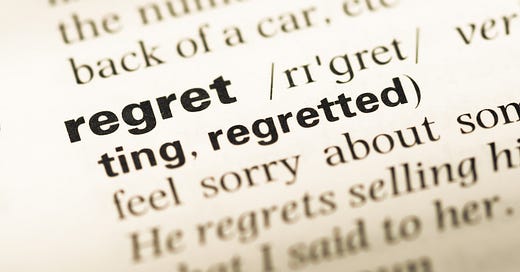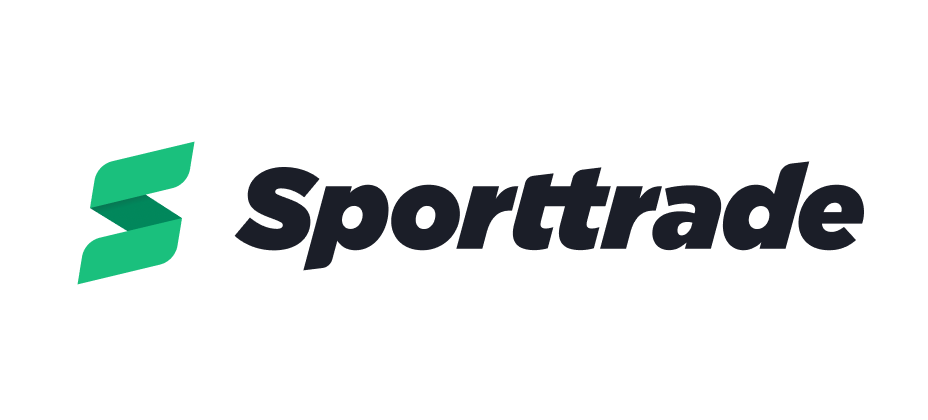Regrets, I've Had A Few
If they could go back in time, sports betting supporters would change this one thing about legalization: The amount of advertising.
The Bulletin Board
NEWS: The US and Canada have one specific regret about the legalization of sports betting: the amount of advertising.
NEWS: Online cannibalization critics have more ammunition to fire.
NEWS: Connecticut plans to send a cease-and-desist letter to Bovada.
VIEWS: Efforts to end the sports betting monopolies in Washington, DC, expose a complicated mess.
AROUND the WATERCOOLER: The Poker Hall of Fame is broken.
STRAY THOUGHTS: Fighter’s Fortitude.
SPONSOR’S MESSAGE - Sporttrade was borne out of the belief that the golden age of sports betting has yet to come. Combining proprietary technology, thoughtful design, and capital markets expertise, our platform endeavors to modernize sports betting for a more equitable, responsible, and accessible future.
Sporttrade’s newest feature, The Tape, prints all trades made on the app in real-time.
Legalized Sports Betting Supporters Have One Big Regret
I’ve been talking about the possibility of federal oversight of sports betting in the US, but this is also playing out north of the border in Canada.
The Canadian Parliament is considering a national framework for sports betting advertisements. The bill, S-269, which I first reported on last month, is dubbed the National Framework on Advertising for Sports Betting Act. It was the subject of two Standing Senate Committee on Transport and Communications meetings last week.
“I wish we had considered at the time the flood of advertising that would go along with it,” said Sen. Marty Deacon, the bill’s sponsor, during Tuesday’s meeting, per Canadian Gaming Business.
Regret over the unexpected tidal wave of advertisements isn’t confined to Canada. In a recent podcast appearance, Joe Brennan Jr., one of the architects of New Jersey’s PASPA challenge, told me his one big regret was his inability to see the advertising onslaught.
Per Brennan (you can listen to my entire conversation with Joe Brennan Jr. here):
“… the one big regret I have about our effort in New Jersey for legalization was that we did not spend the time on what may happen with marketing.
“And the reason we didn't wasn't because we were unaware of it. It was because at the time, casinos, lotteries were heavily regulated by the states and how and where and when they could advertise their product. And when PASPA was overturned, they opened this up; I don't know how they got a pass on that.”
As I’ve mentioned in the past, sportsbooks will pout about advertising restrictions and point to the black market bogeyman as the beneficiary, but no one is going to go to bat for the sportsbooks and say they want the same or more sports betting advertisements.
Revenue Reports Are Not Helping the Cannibalization Discussion
There is a growing trend in gambling revenue reports, and if you’re a supporter of legalization, it’s not a good one. The reports are providing people sounding the cannibalization alarm plenty of fodder.
Take the following headlines:
New York gaming shows stagnant land-based results amid record-breaking online sports betting numbers
New Jersey Online Gambling Up, Atlantic City Casinos Down in April Revenue Report
These divergent narratives — online revenue increasing, land-based revenue flat or decreasing — are increasingly common and fuel the cannibalization concerns that have grown louder over the last year.
Online casino legalization went from lukewarm in 2023, when Rhode Island legalized it, and several other states emerged as solid contenders, to ice-cold in 2024, with no reprieve on the horizon. Unions vehemently oppose it, sports betting’s troubles have spilled over to online casinos, and no clear data supports or debunks cannibalization claims.
Eilers & Krejcik Gaming’s (a newsletter sponsor) latest forecast in its Online Casino Monitor lists every online casino candidate as having “low-to-no momentum.” EKG’s 1Q24 Earnings Recap painted an even bleaker picture: “We estimate only four new online casino states over the next five years — an estimate we will soon revise downward.”
SPONSOR’S MESSAGE - Underdog: the most innovative company in sports gaming.
At Underdog we use our own tech stack to create the industry’s most popular games, designing products specifically for the American sports fan.
Join us as we build the future of sports gaming.
Visit: https://underdogfantasy.com/careers
Connecticut Preps a Cease-and-Desist Letter to Bovada
Connecticut has indicated it will follow in the footsteps of Michigan and send Bovada a cease and desist letter.
From Sports Betting Dime’s Robert Linnehan:
“A representative for Connecticut’s Department of Consumer Protection Gaming Division confirmed with Sports Betting Dime that it will be sending a a cease-and-desist letter to Bovada, an illegally operating offshore sportsbook and online casino, within the next week.”
As noted above, Michigan sent a C&D to Bovada two weeks ago. However, Bovada has yet to respond to the Michigan Gaming Control Board.
According to Gaming Today’s Brant James, the MGCB could broaden its scope and go after Bovada’s suppliers, from payment processors to affiliates — the latter would be an extremely intriguing development:
“Bovada’s U.S. suppliers may also face consequences. Certainly, any business relationship with an illegal operator will very likely prevent a company from being licensed to do business in the very large Michigan gaming market. With this letter, we have made a clear statement that Bovada is violating Michigan laws. If Bovada fails to comply with the letter, we would strongly encourage any advertisers, affiliate marketers, payment processors, and other business partners of Bovada to sever ties to avoid potential licensing or legal consequences.”
Bovada has pulled the plug in several other states over the years, including Delaware, Maryland, New Jersey, New York, and Nevada.
DC Sports Betting a Microcosm of the Political Process
Politics is always messy, and the sports betting universe is seeing a glimpse of that now that legalization efforts have stalled.
As I’ve previously written, the hangups are not always about sports betting or online gambling; there is a lot of backroom horse-trading involving unrelated issues.
A case in point is Washington, DC, where an effort to end the Intralot-FanDuel monopoly has become a political football.
Councilmember Kenyan McDuffie is leading the charge to bring more mobile operators to the district, and now he’s being attacked for it.
As reported by the Washington Citypaper:
“A new website labels McDuffie’s plan a “bill for billionaires” that “worsens the D.C. budget crisis” by costing it $100 million in “guaranteed city revenue for essential services,” all while “helping only billionaire pro sports team and casino owners.””
The website is funded by the Regional Alliance for Small Business Executives, headed by Emmanuel Bailey, who, according to Citypaper, “is a longtime political operator and the top executive at Veterans Services Corporation, a subcontractor on the sports betting deal that has battled persistent allegations that it isn’t doing the work it’s promised.”
The group has astroturfed a letter-writing campaign from small businesses with betting kiosks, which, according to Citypaper, “Some haven’t even removed emailed instructions from Bailey or other lobbyists before sending them.”
McDuffie is pushing for the change to fund a project he supports, a Baby Bonds program, which would receive 100% of the funding under McDuffie’s proposed bill.
None of this is about who is right or wrong. It merely demonstrates the messy nature of the political process, where pet projects are pushed, lobbyists put their thumb on the scale, and when a load of money is on the line.
And DC isn’t an outlier. Minnesota and Alabama were extremely messy battles, and who can forget this saga from Indiana: Gaming the system: Inside the rise and fall of Indiana’s casino king.
SPONSOR’S MESSAGE - Now live on the OpticOdds screen: player market alternate lines, vig, line history & more…
Built for operators with an emphasis on speed and coverage, OpticOdds offers:
SGP Pricer: query top operators and instantly see how correlations are priced in real-time.
Live Alerts & API Access: get odds updates from sharp sportsbooks on best odds, arbitrage, player markets, reference lines, settlements, injuries, and more.
Market Intelligence: analyze competitor markets to see what you’re missing. Drill into hold, alternate lines, uptime, and release time.
Join top operators at opticodds.com/contact.
Around the Watercooler
Social media conversations, rumors, and gossip.
Three cheers for Adam Schwartz!
Honestly, broken doesn’t even begin to describe the problem.
This is something I’ve been saying for years. The Poker Hall of Fame was created as a gimmick, and while it has evolved into a prestigious honor, the process hasn’t evolved. I’ll discuss this more in Friday’s feature column.
Stray Thoughts
“Fighters Fortitude.” ~ David “Tank” Abbott
On a recent Joe Rogan episode, OG UFC fighter David “Tank” Abbott talked about the difference between fighting and martial arts, which he called Fighter’s Fortitude.
“Martial arts is martial arts. It works. It’s a skill,” Abbott said. “Fighting is [different]. Fighting is not a skill that you learn and become tough. Royce Gracie isn’t tough because he knows jiu-jitsu. He’s a tough man. All these guys that fight in the UFC are tough men, not because they know skill.”
“Fighting is emotional; it’s not about skill,” Abbott said. “It’s what’s inside your head, the heart you have, and what you need to do to get things done,” which Tank called the point where you can decide to kill someone or not.
When you take a tough man and give him skills, look out. As Tank said, you can’t become tougher by learning things; you become tougher.









With advertising, it goes back to one thing I said previously they mislead with terms and conditions. These promos none of the public reads those terms and get misled into joining and thus gamble way beyond their means and we have the addiction problem.
There has been a lot exposed this year about the things that we’re missing from when paspa was exposed. The advertising oversight, the harassment issue which has become exposed this year thanks to inmature uneducated people who also whine when a player gets hurt they demand a void but that’s a different discussion. The lack of proactiveness by the industry and a lot of the states to make sure that college athletes and pro athletes can’t bet from their locations on campus or at facilities via geo blocking to where they can’t access the apps or even open up accounts prohibited bettor lists should of been mandated from the get go. I have to again pin point to the uk and other international communities or even the tobacco style of regulation for the sports betting advertising of it.
Coming from someone in the state of Nevada that bets I was ok with paspa been repealed and each state allowed to regulate but it should of done more cautiously with smart industry people, leagues, the public and regulators to come to a good middle ground where everyone is happy. We are instead this go down the path that is not good. We are seeing consolidation which is bad for the consumer, the addiction issue due to an over saturation of advertisement on a public that’s not the most educated, the scandals and harassment of athletes. I just wonder when the house of cards is gonna collapse as I see it coming sooner then later on the sports betting industry